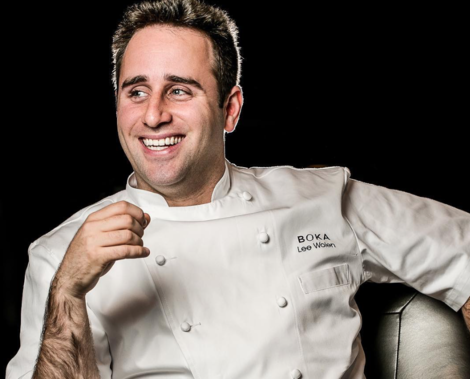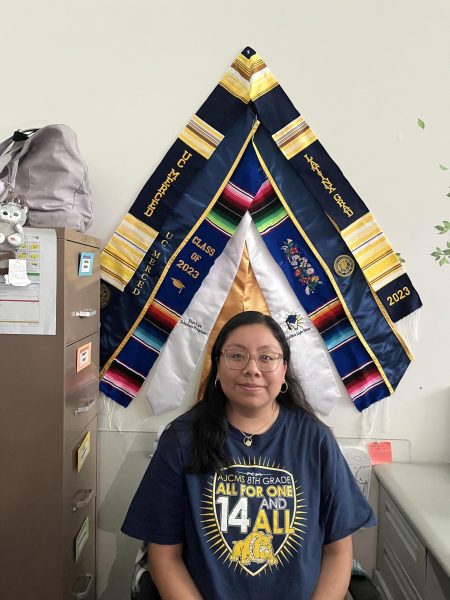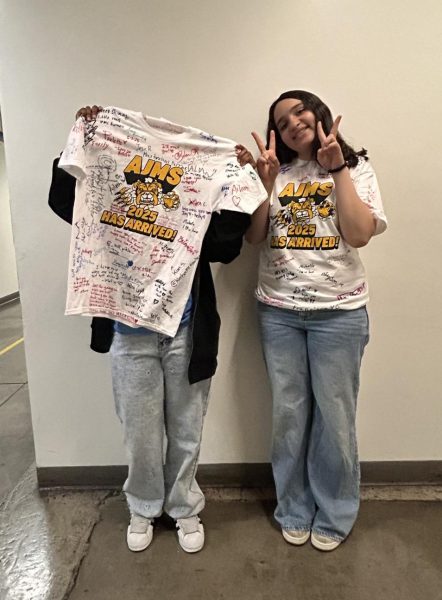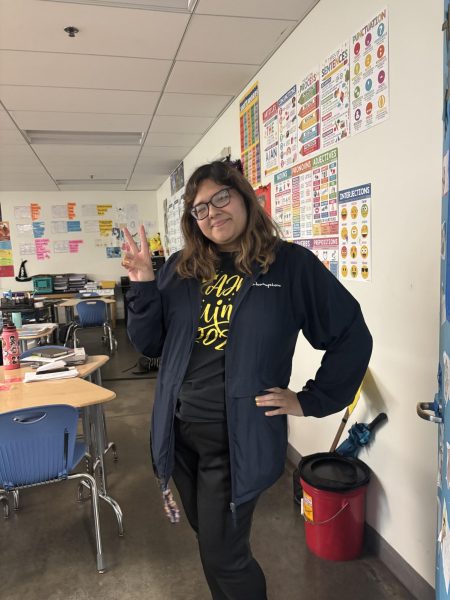Lee Wolen: The life of a chef

Lee Wolen is an award-winning chef, which includes a Michelin star for his restaurant in Chicago, Boka, and an appearance on Iron Chef America, but he is a passionate cooker that doesn’t work for awards and cares for the people he cooks for. Besides Boka, he is executive chef at GG’s Chicken Shop and is currently planning to open a new Italian restaurant later this summer. Along with Mr. Finer (who went to school with Wolen), I asked him some questions about the life of a chef. Here are his answers.
[This transcript has been lightly edited for clarity]
Miguel Meza: What inspired you to be a chef?
Lee Wolen: Numerous things. I didn’t love the normal everyday, you know, kind of school into a 9 to 5 job. That never really did it for me. I wasn’t the perfect student, as Carl probably could remember, so you know I think this industry lends a really different hand to people that might not want to follow the same guidelines as every other career. It’s very inclusive, it has nothing to do with grades it has nothing to do – sorry you still there?
MM: Yeah.
Carl Finer: Yup.
LW: You know, it has nothing to do with your grades, it doesn’t really have anything to do with your background, so for me I enjoy working with so many different cultures and that’s really important to me – to walk into a restaurant and the dishwasher might not speak any English and the food runner might only understand the words that you know what the food is and how they can talk to the guest, but nothing outside of that. I think it’s really cool for me to be able to teach young people and to take a seventeen year old Mexican kid that didn’t graduate high school that was my dishwasher is now my sous chef nine years later. There aren’t many other careers that you can say that.
You can’t be the janitor of a law firm and then in ten years be the lawyer. It just doesn’t work that way. I don’t have a [college] degree, I have a culinary degree that was like eleven months. [I appreciate] just to be able to be in a career that [doesn’t require] a four year college degree is really important to me. I would have never made it through four years of college. I’m not telling you not to do that, but there’s no chance I could have made it through four years of college and become a lawyer it’s just not in me.
MM: So what where some of the adversities in your culinary career?
LW: Some of the what?
MM: Adversities or problems?
LW: I was fortunate to have a family that supported it. I know now you know a chef is like a famous or kind of a good career I guess in the eyes of people because there are celebrity chefs, but I do think a lot of people 16 years ago, I’ve been cooking for almost 20 years now, and it’s not as glamorous as as people think it is and it’s really hard to make it in this career.
The average chef earns you know 55 to 85 thousand dollars a year and while certain ones make multi millions that usually has to do with TV. So I do think the financial aspect of being a chef is difficult. If you go to law school or you go to a different school like medical school there are a lot of bills to pay back after you graduate but you make a lot of money of the bat. If you see any industry fighting for minimum wage or equal pay it’s the restaurant industry. Whether it’s McDonald’s or fine dining, we all work, it’s all restaurants, so you know money has always been a challenge.
I I don’t come from much. My mom is a nanny. My entire life I never made a lot of money until recently. I’ve done pretty well, but my average was $14 to $16 an hour for a long time. So you know, you see other friends making money or whatever it is and your’re always the guy that didn’t make a ton of money, but I don’t do this for money.
Yes now I have a family and a whole life, so I do have to do it in part for money, but growing up I never did it for money. I worked many years for free. I worked a year in Spain for free, six months in England for free, and all my friends thought I was nuts. But it paid off. I do better, I don’t think I have a friend that does half as well as I do because I put my mind to it and they didn’t. Some went the four year route and they switched careers five times.
Carl, I know you know my buddy Noah.
CF: Yea.
LW: He’s had seven different careers and many different degrees and it’s just playing catch up. This career is very satisfying. You get to cook for people, you get to make people happy. We always work on holidays and Saturday nights, but that’s when people celebrate. So for me cooking for people that are celebrating is very important and that’s that’s another reason I love doing this.
You know, it’s like if you are a firefighter, I think you’re crazy to jump into a burning building, but they have something in them that’s very different than everyone else. They want to do something for someone else. That’s a big reason I cook too. I do like helping people celebrate special life events and that’s a big plus for me of of why I do this as well.
CF: I know it’s your interview Miguel, but I’ve been twice at Boka, once when I was just there on my own, but last time I was in Chicago a couple years ago I was with a group of friends. There were seven or eight if us and ya’ll took care of us. They were really into food and the friend who was the lead of that actually passed away two years ago of breast cancer. She was my best friend from LA and she would talk about that meal with with all of us, with all the friends in Chicago at Boka, and it was one of the most like memorable meals she’s had. So thank you to you and your team. She talked about it a lot.
Sorry, go ahead Miguel.
MM: So from what you said, what has let you face all those challenges. Was it your passion for cooking?
LW: I think so. Yeah, it’s like you know, that’s all I know, how to do is cook. I don’t really have a second job that I could fall back on. I don’t want to say I enjoy missing my kids’ birthdays, but now I’m in a good position to be able to have a staff that I can leave the restaurant when I need to leave the restaurant to do these things. But I do think the daily love of and passion for cooking, which a lot of people don’t have. I don’t think you wake up everyday, no offense, excited to go work at Target, but …
CF: Only my dad.
LW: What’s that?
CF: Only my dad [Laughs].
LW: Does he work at Target?
CF: He was working at Walmart before the pandemic and Mitch and I we were kind of worried about him and we got him eventually to stop working for a while. But we, like, couldn’t stop him from going to Walmart. He kept going up there even after he stopped because he wanted to talk to people. He just started working again. He went back, knocking on doors yesterday, picking up some hours at, I forget which drug store, but he went and found something.
LW: Yeah.
CF: Sorry go ahead.
LW: Yeah, so it’s like, you know, the passion of cooking. I guess it’s really something that lets you overcome the things that are kind of a pain in the butt with it. Because at the end of the day, you work late, you scrub kitchens, there’s a lot of ugly that comes with a lot of good, but I think that’s with every career, but this one really takes hard work and dedication to make it. If you only see top chefs and Gordon Ramsay is the only thing you want to be, it’s a big mistake to be in this career for fame because very very very few people get famous.
MM: When you got your first Michelin star, what went through your mind and what did you think?
LW: It was like a year and a half after I moved to Chicago. It was definitely something I wanted to do. I think it’s a really good way to break into a city and no one knew me here. I’d never worked here. I wasn’t a chef in Chicago before I moved from New York and Cleveland and what not. I think that awards aren’t everything, but they definitely help at the end of the day. They do bring business and for me it’s all about being busy.
A slow restaurant is a bad restaurant. It could be a good restaurant, but it’s a bad restaurant if [nobody is eating the food]. I think three stars is something I would never ever care about. It doesn’t do anything for me, but one star restaurants that are really busy are for me my favorite restaurants because there’s a high level of execution of food and service, but it’s still affordable and kind of welcoming for almost everybody that can afford to eat at a place like Boka. Because you know our check average is $100. That’s a lot of money, but it’s not that you can come only once a year for most people. You know, the $400 and $500 dinners aren’t really for me anymore.
But yeah, I think [earning the Michelin star] is super special. The team loves it um and it just kind of showed like it paid off for years of struggling to become a chef.
MM: What has been the greatest achievement of your life?
LW: I think, apart from having kids and making that work, I do think Boka is really cool because Boka was a restaurant that was going to close. The owners that owned Boka, last names Boehm and Katz, um Giuseppe was the chef before me and he opened a new restaurant and Boka really went downhill when he kind of let the sous chef run the place. It went from a really high earning restaurant to a very very low earning restaurant and was pretty much losing money each month. So yeah, we took it from $2.7 million restaurant to now where about $5.5 to $6 million a year is what we do in revenue. For me it’s just crazy that we keep getting busier. so far this May has been the busiest month we have ever had and we’re at only 70% occupancy. It’s near impossible to get a reservation right now and and it’s just baffling that so many people want to come to Boka, so for me to turn a restaurant upside down into a positive is my coolest achievement.
MM: I know you don’t really care that much about achievements or awards, but if somebody wanted to how could they win a Michelin star?
LW: I don’t know if you really win it. You earn it. I think it takes a lot of time. I think if it’s the only goal in life, I don’t know if that’s the right goal. I think that social media and awards have kind of become the focal point of life. I think learning everything you can and if it comes, you know, when you open a restaurant or are the chef, I think that’s the most important thing. I don’t think only cooking for Michelin is the important thing because you have to know your clientele.
You have to cook for the guest. People who only cook, that only cook for stars don’t last long. I don’t cook for stars. I think our most popular dish is chicken, and it’s a really really well done chicken, but that’s what people like to eat, you know, and we cook for the guest and we happened to get a Michelin star. I think if we’d cooked for Michelin and not the guest and you get a Michelin star and the only people that eat there are the Michelin inspectors you know that’s a big problem.
MM: Do you think anyone can be a chef or do they have to have something special?
LW: You know I think the good thing about being a chef is that there’s many levels of being a chef. You can be the chef of a college, you can be the chef of a banquet kitchen, you can be the chef of a Michelin starred restaurant, you can be the chef of a casual restaurant. So you know the crazy artistic people like Grant Achatz, you know he has his route, but there are many routes in this industry for people that want to cook and lead kitchens which is another reason this is a good career. Because if I want to take the pressure of myself and not run Boka in ten years, you know maybe I go to a hotel in North Carolina and it’s a little less stress and it’s small and something much more manageable than 50 to 60 staff members that I have to worry about and what not. But I do think anyone can be a chef. If you want to be the chef of a bar it’s probably less stressful than a three Michelin star restaurant, but I think that’s what makes this career cool – there’s many lanes to take and still be able to be a chef.
MM: Lastly, what advice would you give to anyone who was trying to get into the culinary field?
LW: I think there’s two routes: culinary school or not culinary school. I personally it’s a waste of money if you want to cook. Parents would probably tell differently, but I do think that if you want to start cooking you need to have a mental aspect, that it’s really challenging, it’s not fun and games. Any time you want to be at the top of your career you have to put in a lot of work, whether that’s a athlete or a chef, but you know it takes patience and and if you if you don’t have patience to move up it it doesn’t work in this career.
A lot of people I knew, they took sous chef jobs at age 22, saying, “Oh it’s going to pay me $40,000 a year, but you’re a sous chef of a bar. You have to be careful of the title because if all you know is bar food you’re never going to be a Michelin starred chef. And even though your 22 [years old] making $40,000 a year, by the time you’re 60 you’re probably still going to be making $42,000 a year, so you really have to put your time in and make the right decisions and right steps and not go for the money. The money will come, but it definitely does come later as an adult than being a lawyer or a doctor. It’s just part of being a chef. It doesn’t just happen overnight. You have to learn a lot and and that’s not taught in school. It’s taught in restaurants. So, I think patience is the biggest key to being a chef, and not jumping at the money early.
MM: Thank you very much for your time. Thank You.
LW: Yeah.
CF: I’m curious Lee. You’re talking about your patience, and bringing it back to earlier when you talked about going to Spain to learn, going to England to learn, can you talk a little but more about how you found that or decided on that?
LW: Yeah. I mean there’s really famous restaurants in Europe and I thought I should leave the country for a little bit just to check out what else goes on there. I had enough money saved, they paid for housing, and I think it’s important to make a life, not just to stay in South Euclid, Ohio your entire life you know –
CF: That’s how I ended up in LA and my brother in Florida. We weren’t [content] to be happy staying inside our little bubble.
LW: Yeah, because all the people I know that stayed in one place forever, and again no offense to them, we’ve grown apart. They’re very different than me, they see the world very different. They’re very closed-minded and I just never wanted to live like that. I like to travel. I like seeing other cities. I like living around many cultures. I don’t like living around just one culture, you know, and I wanted to raise my kid in city or at least close to cities just to see different opportunities than a very far suburb of a very small city because it opens your mind and travel travel definitely opens your mind.
CF: I have one more question to follow up. At the end, when you mentioned, you said you have a staff of 50 or 60. At this point how much is [your job] managing people or thinking about the business and how much is thinking about the cooking and is that something for Miguel to think about too.
LW: Yeah, I mean I don’t cook a ton right now. I’m opening another restaurant so I have I have two chefs that kind of run things, but one runs Boka, one runs the new place and then I have a lot of sous chefs. But yeah, you do become less involved in cooking if that’s what you want. I mean, I wanted to grow because you do need to grow with more restaurants to make more money in this industry. You can’t have one restaurant and make all the money you might need to make. It’s not like if you’re packed you can just start making more money. The amount of money maxes out because the restaurant is only so big. So it definitely becomes more of a management thing and hiring the right people rather than cooking, cooking, cooking, but you don’t want to be 55 years old and be cooking everyday. It’s too much work.
CF: [Laughs]
LW: Yeah.
MM: I think that was it. Thank you very much again.
LW: Yeah, of course thank you, good to meet you.
CF: Yeah. Thanks for your time, Lee. I really appreciate. It’s good to catch up.
LW: Of course, let us know when you come back to Chicago.
CF: Absolutely. Will do. And I’ll try to get Mitch and Christina and Ruthie up there at some point.
LW: Okay, yeah please.
CF: Alright bye y’all.
LW: Thanks guys!
CF: Thanks Lee!
MM: Bye, thank you.







Julia Hernandez • Jun 7, 2021 at 9:27 am
You really asked good question to Chef Lee Wolen it is also really amazing that you spoke to him 😀
Christopher Garcia • Jun 7, 2021 at 8:20 am
I didn’t have time to finish this article but he became who he wanted to be without a high school degree and a college degree.